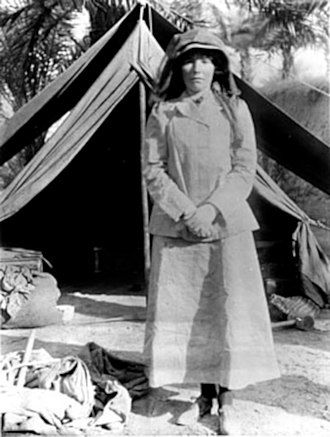Gertrude Bell

Gertrude Margaret Lowthian Bell, CBE (14 July 1868 – 12 July 1926) was an English writer, traveller, political officer, administrator, and archaeologist[2] who explored, mapped, and became highly influential to British imperial policy-making due to her knowledge and contacts, built up through extensive travels in Syria-Palestine, Mesopotamia, Asia Minor, and Arabia.[3] Along with T. E. Lawrence, Bell helped support the Hashemite dynasties in what is today Jordan as well as in Iraq.
She played a major role in establishing and helping administer the modern state of Iraq, using her unique perspective from her travels and relations with tribal leaders throughout the Middle East. During her lifetime she was highly esteemed and trusted by British officials and exerted an immense amount of power. She has been described as “one of the few representatives of His Majesty’s Government remembered by the Arabs with anything resembling affection”.[4]
Bell was born on 14 July 1868 in Washington New Hall – now known as Dame Margaret Hall – in Washington, County Durham, England to a family whose wealth ensured her education and enabled her travels.[5] Her personality was characterised by energy, intellect, and a thirst for adventure that shaped her path in life. Her grandfather was the ironmaster Sir Isaac Lowthian Bell, an industrialist and a Liberal Member of Parliament, in Benjamin Disraeli’s second term. His role in British policy-making exposed Gertrude at a young age to international matters and most likely encouraged her curiosity for the world, and her later involvement in international politics.[6]
Bell’s mother, Mary Shield Bell, died in 1871[7] while giving birth to a son, Maurice (later the 3rd Baronet). Gertrude Bell was just three at the time, and the death led to a lifelong close relationship with her father, Sir Hugh Bell, 2nd Baronet, a progressive capitalist and mill owner who made sure his workers were well paid and cared for.[8]:33–34 Throughout her life, Gertrude consulted on political matters with her father, who had also served for many years in various governmental positions.
Some biographies suggest the loss of her mother caused underlying childhood trauma, revealed through periods of depression and risky behaviour. But when Gertrude was seven years old, her father remarried, providing her a stepmother, Florence Bell (née Olliffe), and eventually, three half-siblings. Florence Bell was a playwright and author of children’s stories, as well as the author of a study of Bell factory workers. She instilled concepts of duty and decorum in Gertrude and contributed to her intellectual development. Florence Bell’s activities with the wives of Bolckow Vaughan ironworkers in Eston, near Middlesbrough, may have helped influence her step-daughter’s later stance promoting education of Iraqi women.[9]
Gertrude Bell received her early education from Queen’s College in London and then later at Lady Margaret Hall, Oxford University,[10] at the age of 17. History was one of the few subjects women were allowed to study, due to the many restrictions imposed on them at the time. She specialised in modern history, and it was said that she was the first woman to graduate in Modern History at Oxford with a first class honours degree, a feat she achieved in only two years.[11]:41 Eleven people graduated that year. Nine were recorded because they were men, and the other two were Bell and Alice Greenwood.[12] However, the two women were not awarded academic degrees. It was not until 1920 that Oxford treated women equally with men in this respect.[13][14]
Bell never married or had children. She befriended British colonial administrator Sir Frank Swettenham on a visit to Singapore with her brother Hugo in 1903 and maintained a correspondence with him until 1909.[15] She had a “brief but passionate affair” with Swettenham following his retirement to England in 1904.[16] She also had an unconsummated affair with Maj. Charles Doughty-Wylie, a married man, with whom she exchanged love letters from 1913 to 1915.[17]:14–17 After his death in 1915 during the Gallipoli Campaign, Bell launched herself into her work.
